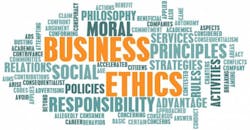Supply Chain Scores High on Sustainability but Low on Labor Issues
The 2019 edition of the Global CSR Risk and Performance Index is out and the findings are a mixed bag.
The report, issued by EcoVadis, analyzed the supply chain sustainability performance of more than 30,000 companies worldwide, across 2016 through 2018. The scores are based on 21 CSR criteria across four themes -- environment, labor practices and human rights, business ethics and sustainable procurement. The scale ranges from zero to 100, where a score less than 25 represents high risk, 25-44 represents medium risk, 45 and above are considered engaged, and scores of 65 and above are considered advanced to outstanding.
"Private-sector commitment to sustainability continues to build, as evidenced by initiatives like the recent Business Roundtable statement on corporate purpose," .said Pierre-Francois Thaler, co-CEO of EcoVadis. "While we're seeing slight year-on-year improvements across most themes, and many headline-grabbing public promises, this year's analysis shows companies remain mostly stagnant around supply chain sustainability. With most global enterprises spending 50-70% of revenue in the supply chain, it's the most natural and effective foundation for driving the structural change these commitments are intended to create."
Select highlights from this year's analysis include:
- Global sustainability performance holds steady. Overall, sustainability and risk scores remained consistent over the past three years, with 50.7% of companies receiving scores of 45 or higher in 2018, compared to 49.2% in 2017 and 50.5% the year prior
- Despite greater awareness of labor issues, many companies lack thorough measures for addressing diversity, discrimination and harassment. While 32% of companies across the globe implement at least one measure – such as effective whistleblowing procedures, awareness training and anti-discrimination recruitment tactics – 68% still have no measures in place to promote equality and inclusive working environments. Regionally, North American companies (56%) have the most measures in place.
- Globally, Europe leads the world in sustainability performance among large companies, followed by North America, Latin America and the Caribbean and then Greater China.
- Greater China improves but still has a substantial performance gap to close. The weighted overall score for large companies in Greater China is 33.6. While this represents a 3.6-point increase in 2018, Greater China remains the lowest-scoring region assessed, with a weighted large organization score that's more than seven points below the global average.
- Organizations increase focus on labor and human rights. Large companies scored higher in the environment theme (43.5 vs. 41.3) and labor and human rights (46.7 vs. 44.4) whereas small and medium-sized companies outperform large counterparts (40.9 vs. 39.8) in corruption, anti-competition and data privacy. The emphasis on labor and human rights is consistent with the findings of EcoVadis' 2019 Sustainable Procurement Barometer.
Sustainable procurement remains the lowest-scoring theme, highlighting the urgent need for organizations to more proactively engage with supply partners to uncover and address hidden CSR risks. When left unmanaged, the deepest tiers of the supply chain can expose organizations, people and society to serious issues, including slavery, forced labor, dangerous working conditions, environmental waste, corruption and more.
"There needs to be a conscious effort to improve supply chain visibility, transparency and collaboration – with a focus on risk identification and improvement." said Thaler. " Stated more bluntly: Enterprises can't mitigate the risks they don't see. Procurement leaders have immense power to spark change, reduce exposure and move the dial on corporate purpose and responsibility. Success starts with getting assessed and properly assessing the supply base."
Notably, more than 75% of companies that were assessed at least twice maintained or improved their score in the latest assessment, proving that sustainable procurement commitments make a difference.
